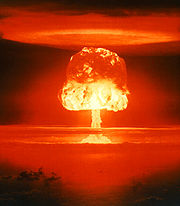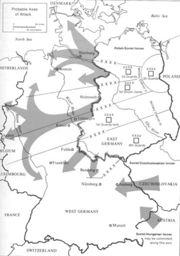World War III

World War III (also WWIII, or the Third World War) denotes a hypothetical successor to World War II (1939–1945), that is often suggested to be nuclear and extremely devastating in nature.
This war is anticipated and planned for by military and civil authorities, and explored in fiction in many countries. Concepts range from purely conventional scenarios or a limited use of nuclear weapons to the destruction of the planet.
With the development of the arms race, before the collapse of the Soviet Union and end of the Cold War, an apocalyptic war between the United States and the Soviet Union was considered plausible, if not likely. The Doomsday Clock has served as a symbol of historic World War III close calls since the Truman Doctrine went into effect in 1947.
Contents |
Greatest threats

During the Suez Crisis of 1956, Soviet Premier Nikolai Bulganin sent a note to British Prime Minister Anthony Eden warning that "if this war is not stopped it carries the danger of turning into a third world war."[1]
The Cuban Missile Crisis in 1962 is generally thought to be the historical point at which the risk of World War III was closest,[2] and Robert McNamara claimed that if it were not for Vasili Arkhipov, who prevented a nuclear launch on the B-59 Soviet submarine during the heat of the crisis, World War III would have broken out, saying at the Cuban Missile Crisis Havana conference, "A guy called Vasili Arkhipov saved the world."
On 26 September 1983, a Soviet early warning station under the command of Stanislav Petrov falsely detected five inbound intercontinental ballistic missiles. Petrov correctly assessed the situation as a false alarm, and hence did not report his finding to his superiors. Petrov's action likely averted a nuclear conflict, as the Soviet policy at that time was immediate nuclear response upon discovering inbound ballistic missiles.[3] According to a report by Geoffrey Forden, published for the Cato Institute, the most likely culprit for the false alarm was the Cosmos-1382 satellite belonging to the Oko early warning system.[4]
During Able Archer 83, a ten-day NATO command post exercise starting on November 2, 1983, the Soviets readied their nuclear forces and placed air units in East Germany and Poland on alert. Some historians believe this exercise was a close call to a start to World War III.[5]
Difficulty in determining a "World War"
The English term "World War" has only seen widespread use during one conflict—World War II. The German biologist and philosopher Ernst Haeckel wrote this shortly after the start of World War I:
| “ | There is no doubt that the course and character of the feared "European War"...will become the first world war in the full sense of the word.
Indianapolis Star September 20, 1914[6] |
” |
This is the first known instance of the term First World War. The term was used again near the end of the war. English journalist Charles A. Repington (1858–1925) wrote:
| “ | [Diary entry, September 10, 1918]: We discussed the right name of the war. I said that we called it now The War, but that this could not last. The Napoleonic War was The Great War. To call it The German War was too much flattery for the Boche. I suggested The World War as a shade better title, and finally we mutually agreed to call it The First World War in order to prevent the millennium folk from forgetting that the history of the world was the history of war.
The First World War, 1914–1918 (1920)[6] |
” |
Known as The Great War in the 1920s, it ignored the Napoleonic wars as having the dubious honour of being the first to be called the "Great War" although it, like the Cold War, was a collection of coalition conflicts, and not a single continuous conflict as was the Second World War.
It may take years before another major conflict could be arguably recognized as a World War III. Serious wars before and after the first two world wars, even those closely associated with them, are not now treated as part of the larger conflict. These include the Balkan Wars from 1912 to 1913 and the Polish-Soviet War from 1919 to 1921, the Japanese invasion of Manchuria and later China, the Spanish Civil War, the Italian invasions of Ethiopia and Albania, the 1938 German annexation of Austria (Anschluss), and the subsequent occupation of Czechoslovakia. Therefore, the specific event where a future World War III begins may only be determined retroactively.
Some analysts[7] and historians[8] have suggested the Cold War can be identified as World War III because it was fought on a global scale by proxy combatants of the United States and later NATO, and the Soviet Union and Warsaw Pact countries.[9] In a 2006 interview, U.S. President George W. Bush likened the ongoing War on Terrorism as being like "World War III".[10]
Popular culture
World War III is also a common theme in popular culture. A vast apocalyptic and post-apocalyptic science fiction literature exists describing the postulated execution and aftermath of World War III, several notable movies have been made based on World War III, and it is the topic of various comics, video games, songs, magazines, radio programs, newspapers, websites and billboards.
Quotations
| “ | If the Third World War is fought with nuclear weapons, the fourth will be fought with bows and arrows. | ” |
| “ | I do not know how the Third World War will be fought, but I can tell you what they will use in the Fourth - rocks! | ” |
See also
- List of nuclear holocaust fiction
- Nuclear war
- The War of the Worlds (disambiguation)
- Society for the Prevention of World War III
- Operation Dropshot
- Operation Square Leg
- Operation Unthinkable
- Plan Totality
- Seven Days to the River Rhine
References
- ↑ "The Nuclear Seduction". escholarship. http://www.escholarship.org/editions/view?docId=ft1n39n7wg&chunk.id=d0e1874&toc.depth=1&toc.id=d0e1874&brand=ucpress. Retrieved 2010-01-`6.
- ↑ http://www.jcs-group.com/military/navy/1962cuban.html
- ↑ "The Man Who Saved the World Finally Recognized". Association of World Citizens. http://www.worldcitizens.org/petrov2.html. Retrieved 2007-06-07.
- ↑ Geoffrey Forden (May 3, 2001). "Reducing a Common Danger: Improving Russia's Early-Warning System". Cato Policy Analysis No. 399.
- ↑ John Lewis Gaddis and John Hashimoto. "COLD WAR Chat: Professor John Lewis Gaddis, Historian". http://www.cnn.com/SPECIALS/cold.war/guides/debate/chats/gaddis. Retrieved 2005-12-29.
- ↑ 6.0 6.1 The Yale Book of Quotations (2006) Yale University Press, edited by Fred R. Shapiro
- ↑ Naton in his World War IV: The Long Struggle Against Islamofascism
- ↑ On the July 10 edition of Fox News' The Big Story, host John Gibson interviewed Michael Ledeen, resident scholar at the American Enterprise Institute (AEI), and said: "Some are calling the global war on terror something else, something more like World War III." But Ledeen responded: "It's more like World War IV because there was a Cold War, which was certainly a world war...Probably the start of it [World War IV] was the Iranian revolution of 1979." Similarly, on the 24 May edition of CNBC's Kudlow and Company, host Lawrence Kudlow, discussing a book by former deputy Under-secretary of Defense Jed Babbin, said: "World War IV is the terror war, and war with China would be World War V.",
- ↑ A little more than a month after the September 11 attacks, Eliot Cohen, the director of strategic studies at the Paul H. Nitze School of Advanced International Studies at Johns Hopkins University, declared in the Wall Street Journal that the struggle against terrorism was more than a law-enforcement operation, and would require military conflict beyond the invasion of Afghanistan. Cohen, like Marenches, considered World War III to be history. "A less palatable but more accurate name is World War IV," he wrote. "The Cold War was World War III, which reminds us that not all global conflicts entail the movement of multi-million-man armies, or conventional front lines on a map." Macleans.ca
- ↑ Bush likens 'war on terror' to WWIII. 06/05/2006. ABC News Online
- ↑ Knowles, Elizabeth, ed (1997). The Oxford Dictionary of Phrase, Saying, and Quotation. Oxford University Press. ISBN 0-19-866229-7
- ↑ Andrews, Robert; Biggs, Mary; Seidel, Michael, eds (1996). The Columbia World of Quotations.. Columbia University Press. ISBN 0-231-10518-5.
- ↑ Calaprice, Alice (2005). The new quotable Einstein. Princeton University Press. p. 173. ISBN 0-691-12075-7.
- ↑ Calaprice, Alice; Lipscombe, Trevor (2005). Albert Einstein: a biography. Greenwood Publishing Group. p. 124. ISBN ISBN 0-313-33080-8.
- ↑ Shapiro, Fred; Epstein, Joseph (2006). The Yale book of quotations. Yale University Press. p. 229. ISBN 0-300-10798-6. http://books.google.com/?id=w5-GR-qtgXsC&pg=PA229&lpg=PA229&dq=I+do+not+know+how+the+third+World+War+will+be+fought,+but+I+can+tell+you+what+they+will+use+in+the+Fourth+-+rocks&q=I%20do%20not%20know%20how%20the%20third%20World%20War%20will%20be%20fought%2C%20but%20I%20can%20tell%20you%20what%20they%20will%20use%20in%20the%20Fourth%20-%20rocks
- ↑ A variation of the quote, appearing in sources such as the video game Call of Duty 4: Modern Warfare, runs: I know not with what weapons World War III will be fought, but World War IV will be fought with sticks and stones...
External links
- WWIII Is Coming ´Whether They Like It Or Not´, March 18, 2003, by Stephanie Innes
- Why The Cold War Didn't Become A Third World War
|
|||||